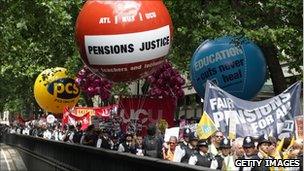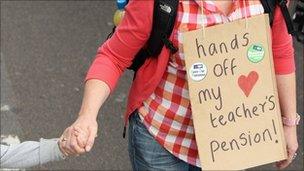At least 12,000 schools hit by teachers' pension strike
- Published

Teachers and lecturers make up the bulk of those protesting
Hundreds of thousands of pupils across England and Wales have missed lessons as teachers staged a one-day strike over changes to their pensions.
At least 12,000 schools are known to have been closed or partly closed. Unions say the total is even higher.
It is the biggest walk-out by teachers in a generation.
The Education Secretary Michael Gove said he was "disappointed" by the strike and that it was unnecessary because talks were continuing.
The action was taken by members of the National Union of Teachers, the Association of Teachers and Lecturers and the University and College union.
Teachers say planned changes will mean they will have to work longer, pay more and get less when they retire.
'Two-thirds affected'
College lecturers also staged a strike and said 350 colleges and 75 universities were affected.
Teachers and lecturers made up the largest group among the hundreds of thousands of public sector workers striking on Thursday over planned changes to their pensions.
According to the Department for Education, about a third of England's schools were completely closed, a third were partially closed and one third were open.
The department based its a calculations on data from 80% of schools.
It confirmed just over 11,000 schools and academies in England had been closed or partially closed.
In Wales, more than half of schools - about 1,000 - were fully or partly shut, with 20,000 teachers there joining the protest.
The NUT estimates 85% of schools in England and Wales were affected.
Christine Blower, general secretary of the National Union of Teachers, said: "Today's action across the country demonstrates the anger and distress that this government is causing teachers. Their unjustified attacks on teachers' pensions are nothing short of disgraceful.
"Teachers are dedicated to the children and young people whom they teach. They are professionals and do not take strike action lightly. But they cannot stand back and see their pensions attacked when all the evidence shows that they are affordable and sustainable and that their costs are falling."
As many teachers prepared to join rallies around the country, Mr Gove went to a primary school in London which was open.
He told reporters: "I feel disappointed that people have chosen to go out on strike today. I understand that there are really strong feelings about pensions and we absolutely want to ensure that everyone in the public, especially teachers, have decent pensions.
The NUT's Christine Blower and Andy Brown of the Association of Teachers and Lecturers explain why they are taking strike action
"We're still in negotiations and the people who really lose out as a result of today's strike are children who are not in school enjoying their lessons, and in particular hard-working parents, who have been put to quite a lot of inconvenience as a result of this action."
The government says changes to public sector pensions are essential to make them sustainable for the public purse and fair to all tax-payers.
The fact that people are living longer means public sector staff should work for longer and pay higher contributions to their pensions, it says.
The impact of the strike on individual schools is varied, depending on how many teachers belong to the ATL and NUT.
Around 220,000 members of the NUT and 80,000 members of the ATL in England and Wales were eligible to strike.
Regional picture
In some parts of the country a majority of schools was disrupted. In Oldham, Greater Manchester, 80% of schools were closed or partially closed.
BBC reporters say 983 schools in Yorkshire were closed or affected by the strike - just over half the total number in the region.
Schools Minister Nick Gibb on union negotiations
Support for the strike appeared to be strong in London.
In the London Borough of Brent, 60 out of 78 schools were closed or partially closed (82%). In Enfield, Hackney and Camden, about 90% of schools were affected.
In Kent and Shropshire, about one third of schools were closed or partially closed, while in Surrey, about a third of the county's 400 state schools were shut.
In East Sussex more than half of schools were closed or partially closed, while about a quarter of schools in Slough were.
Private schools
The strike action also affected some independent schools, although none was reported to have been closed.
Some 18,000 teachers at independent schools are members of the ATL, of whom more than 4,000 voted in favour of striking in the union's ballot.
Lord Hutton, in his review of public sector pensions, said having non public sector workers in state schemes could increase their financial risk.
The ATL fears that the government plans to exclude independent school staff from the pension scheme - which it says would affect 60,000 teachers.
David Levin, headmaster of the City of London Boys' School, said a handful of his staff would be on strike and lessons affected would be covered by senior management.
Mr Levin said teachers who were taking action were doing so in sorrow rather than in anger.
"They think it's a matter of conscience. They are very reluctant and, with great regret, are exercising their conscience."
Family challenge
The Education Secretary Michael Gove had repeatedly complained about the likely impact of the teachers' strike on parents.
Mary Bousted, general secretary of the ATL, said: "We regret any inconvenience caused to parents, but a one-day strike will have significantly less impact on children's education than the damage done by making education an unattractive career".

The action could continue in the autumn
Siobhan Freegard, the co-founder of the parenting website Netmums said many parents were supportive of their children's teachers' right to take action - but support might wane if the action continued.
"It is a pain, there's no doubt about it, lots of mums are having to take time off or make other arrangements, " she said.
"Nobody is really blaming anybody."
"Tolerance is not going to stretch very far because the majority of mums now work. One or two days are fine, and businesses understand, but a lot of people work in situations where businesses aren't going to put up with taking all these days off, and, as with snow days, start docking money."
- Published30 June 2011
- Published30 June 2011